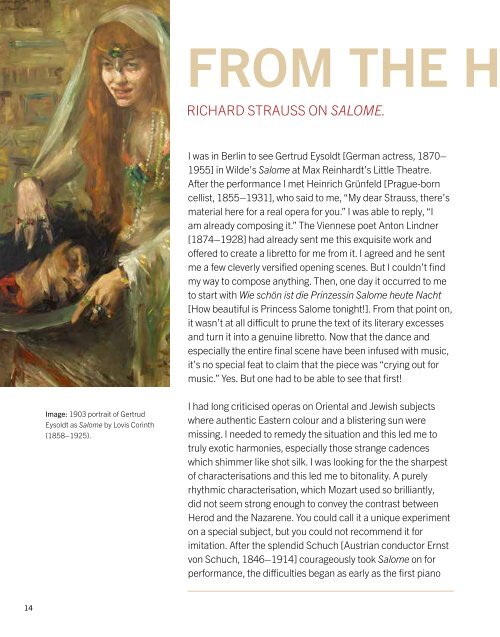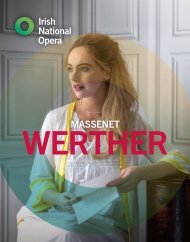Salome 2024 Programme
Create successful ePaper yourself
Turn your PDF publications into a flip-book with our unique Google optimized e-Paper software.
FROM THE HORSE’S MOUTH<br />
RICHARD STRAUSS ON SALOME.<br />
Image: 1903 portrait of Gertrud<br />
Eysoldt as <strong>Salome</strong> by Lovis Corinth<br />
(1858–1925).<br />
I was in Berlin to see Gertrud Eysoldt [German actress, 1870–<br />
1955] in Wilde’s <strong>Salome</strong> at Max Reinhardt’s Little Theatre.<br />
After the performance I met Heinrich Grünfeld [Prague-born<br />
cellist, 1855–1931], who said to me, “My dear Strauss, there’s<br />
material here for a real opera for you.” I was able to reply, “I<br />
am already composing it.” The Viennese poet Anton Lindner<br />
[1874–1928] had already sent me this exquisite work and<br />
offered to create a libretto for me from it. I agreed and he sent<br />
me a few cleverly versified opening scenes. But I couldn’t find<br />
my way to compose anything. Then, one day it occurred to me<br />
to start with Wie schön ist die Prinzessin <strong>Salome</strong> heute Nacht<br />
[How beautiful is Princess <strong>Salome</strong> tonight!]. From that point on,<br />
it wasn’t at all difficult to prune the text of its literary excesses<br />
and turn it into a genuine libretto. Now that the dance and<br />
especially the entire final scene have been infused with music,<br />
it’s no special feat to claim that the piece was “crying out for<br />
music.” Yes. But one had to be able to see that first!<br />
I had long criticised operas on Oriental and Jewish subjects<br />
where authentic Eastern colour and a blistering sun were<br />
missing. I needed to remedy the situation and this led me to<br />
truly exotic harmonies, especially those strange cadences<br />
which shimmer like shot silk. I was looking for the the sharpest<br />
of characterisations and this led me to bitonality. A purely<br />
rhythmic characterisation, which Mozart used so brilliantly,<br />
did not seem strong enough to convey the contrast between<br />
Herod and the Nazarene. You could call it a unique experiment<br />
on a special subject, but you could not recommend it for<br />
imitation. After the splendid Schuch [Austrian conductor Ernst<br />
von Schuch, 1846–1914] courageously took <strong>Salome</strong> on for<br />
performance, the difficulties began as early as the first piano<br />
reading. All the soloists gathered, intending to return their parts to<br />
the conductor, except for the Czech Burian [the Herod of the first<br />
production, tenor Karel Burian, 1970–1924], who was the last to be<br />
asked for an opinion. He replied, “I already know it by heart.” Bravo!<br />
Now the others were embarrassed, and the rehearsal could actually<br />
begin. [A 1905 review reported that Burian found his role so difficult<br />
that he had to study it “not act by act, but bar by bar”.]<br />
During the stage rehearsals, the highly dramatic Frau Wittich<br />
[German soprano Marie Wittich, 1868–1931], who had been<br />
entrusted with the role of the 16-year-old princess with the voice<br />
of an Isolde, occasionally protested with the indignation of a<br />
Saxon Burgomaster’s wife about the difficulty of the part and the<br />
heaviness of the orchestration: “I won’t do that, I am a decent<br />
woman.” The director Wirk [Munich-based director and former<br />
buffo tenor Willi Wirk], was oriented towards “perversity and<br />
ruthlessness,” and she drove him to despair! Yet Frau Wittich,<br />
whose figure was not suitable for the role, was actually right<br />
(though for a different reason); later exotic dancers would use<br />
snake-like movements and swing the head of Jochanaan in the<br />
air in a way that often did exceed all bounds of decency and taste!<br />
Anyone who has been to the Orient and observed the modesty of<br />
the local women will understand that <strong>Salome</strong>, as a chaste virgin,<br />
as an oriental princess, should only be played with the simplest,<br />
most refined gestures, lest her failure against the miracle of a<br />
magnificent world elicit only horror and disgust rather than pity.<br />
(It should be noted here that the high B flat of the double bass<br />
during the murder of the Baptist is not a cry of pain from the victim,<br />
but moaning sighs from the breast of the impatiently waiting<br />
<strong>Salome</strong>. This ominous passage caused such terror in the dress<br />
rehearsal that Graf Seebach [the intendant of the Hofoper in<br />
14<br />
15















